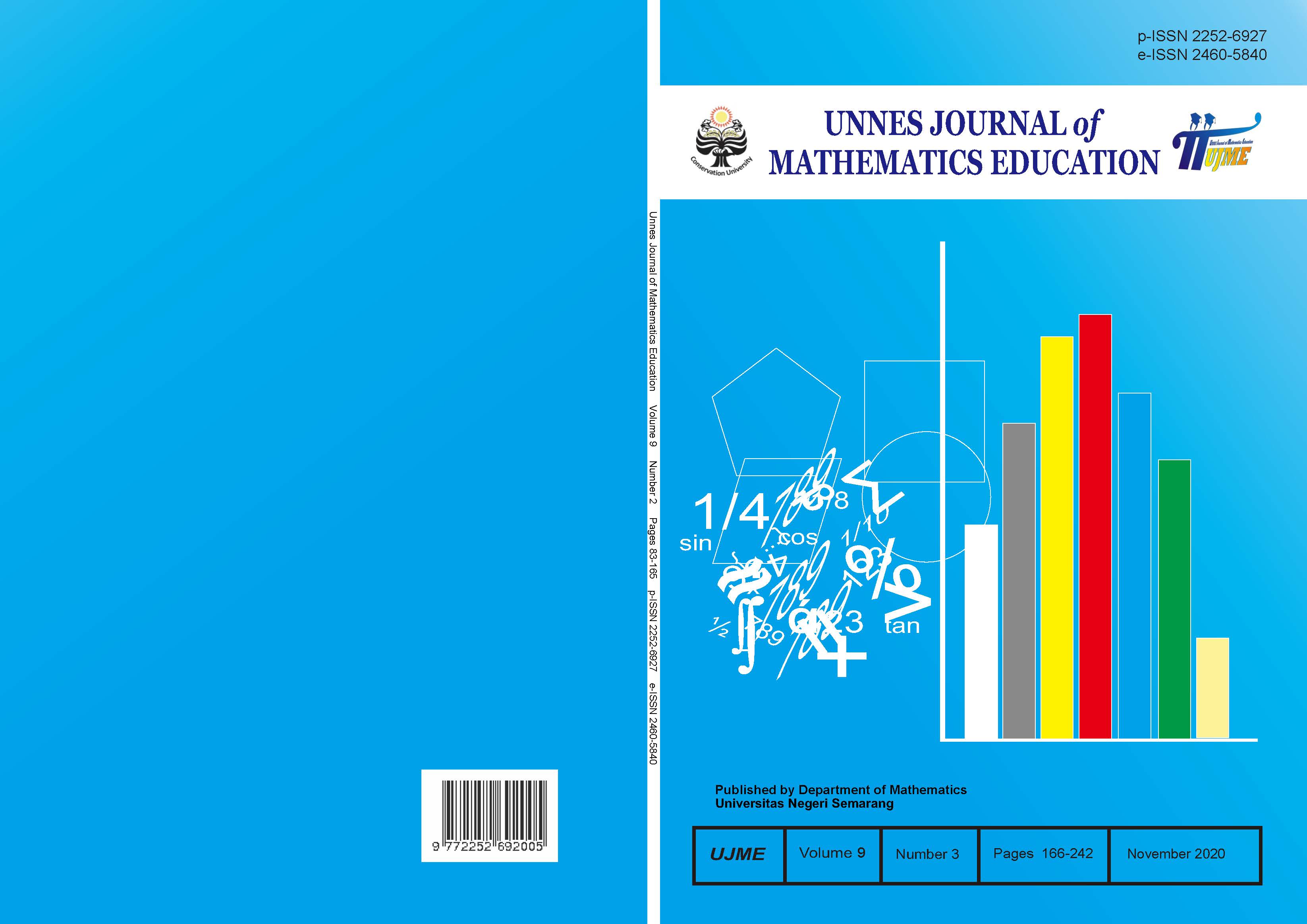Analysis of students' mathematical literacy skills in TAPPS model learning with metaphorical thinking approach assisted by Class Dojo
##plugins.themes.academic_pro.article.main##
Abstract
This research aims to describe students' mathematical literacy skills in the Think Aloud Pair Problem Solving learning model with a metaphorical thinking approach assisted by Class Dojo. The research method used in this study is qualitative. The research subjects were selected by purposive sampling technique based on students’ level of mathematical literacy skills. In this study, data were obtained using triangulation of techniques including test methods, interview methods, and observation methods, as well as using triangulation of sources with 6 research subjects consisting of 2 upper-class students, 3 moderate class students, and 1 lower-class student. Qualitative data analysis includes data validity, data reduction, data presentation, and concluding. The results showed that upper-class students were able to master the six components, there are communication, mathematizing, representation, reasoning and argument, devising strategies for solving problems, and using mathematical tools. Moderate class students are quite capable of mastering the five components, there are communication, mathematizing, representation, devising strategies for solving problems, and using mathematical tools. Lower-grade students were able to master the three components well, there are communication, mathematizing, and using symbolic, formal, and technical language, and operations.
##plugins.themes.academic_pro.article.details##
References
Jufri, L. H. (2015). Penerapan Double Loop Problem-solving untuk Meningkatkn Kemampuan Literasi Matematis Level 3 pada Siswa Kelas VIII SMSPN 27 Bandung. Lemma, 2(1), 52 – 62.
National Council of Teacher Mathematics. (2000). Principles and Standards for Schools Mathematics. Res-ton. VA: NCTM.
OECD. (2016). PISA 2015 Results (Volume I): Excellence and Equity in Education. PISA. Paris: OECD publishing.
OECD. (2017). PISA 2015 Assessment and Analytical Framework: Science, Reading, Mathematic, Financial Literacy and Collaborative Problem-solving, revised edition. PISA. Paris: OECD Publishing.
OECD. (2019). PISA 2018 Result (Volume I): What Students Know and Can Do. PISA. Paris: OECD Publishing.
Mashuri, M., Nitoviani, N. D., & Hendikawati, P. (2018). The mathematical problem-solving ability of student on learning with Thinking Aloud Pair Problem-solving (TAPPS) model in term of student learning style. Unnes Journal of Mathematics Education, 7(1): 1 – 7.
Roesdiana, L. (20160. Pembelajaran dengan pendekatan metaphorical thinking untuk mengembangkan kemampuan komunikasi dan penalaran matematis siswa. Judika (Jurnal Pendidikan Unsika), 4(2): 169 – 183.
Rosyana, T., & Sari, I. P. (2015). Penerapan Aktivitas Quick On The Draw Melalui Pendekatan Thinking Aloud Pair Problem-solving Untuk Meningkatkan Kemampuan Komunikasi Dan Penalaran Matematis Siswa MA. P2M STKIP Siliwangi, 2(2): 192-202.
Sari, R. H. N. (2015). Literasi Matematika: Apa, Mengapa dan Bagaimana?, In SEMINAR NASIONAL MATEMATIKA DAN PENDIDIKAN MATEMATIKA UNY 2015. Yogyakarta.
Setiani, C., Waluya, S. B., & Wardono. (2018). Analysis of Mathematical Literacy Ability Based on Self-Efficacy in Model Elicting Activities Using Metaphorical Thinking Approach. Journal of Physics: Conference Series. doi :10.1088/1742-6596/983/1/012139.
Wahyuni, S. (2009). Menumbuh kembangkan Minat Baca Menuju Masyarakat Literat. Diksi, 16(2): 179 – 189.
Wardono, & Mariani, S. (2018). “The analysis of mathematical literacy on PMRI learning with media schoology of junior high school studentsâ€. Journal of Physics: Conference Series. doi:10.1088/1742-6596/983/1/012107.
Wardono, Rochmad, Uswatun, K., & Mariani, S. (2020). Comparison between Generative Learning and Discovery Learning in Improving Written Mathematical Communication Ability. International Jornal of Instruction, 13(3), 729 – 744.
Winarti, E. R., Haryanti, M. D., & Asih, T. S. N. (2019). Student’s problem-solving ability in thinking aloud pair prolem solving learning assisted by schoology viewed from mathematical disposition. Unnes Journal of Mathematics Education, 8(1): 14 – 18.
